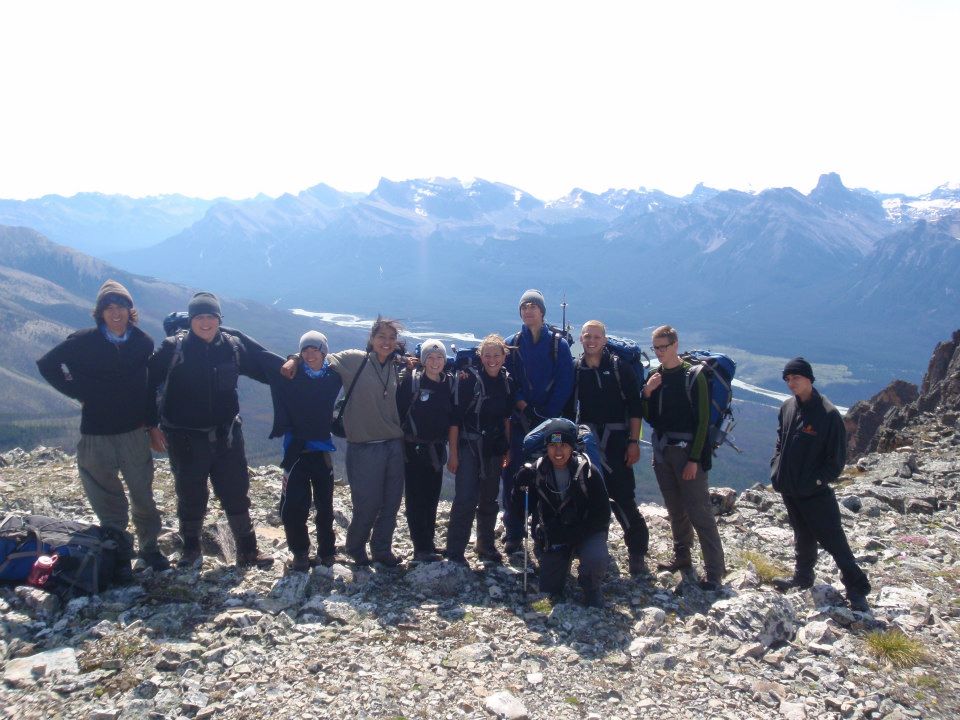
Jeremy Keats crawled out from beneath his shelter. The clear tarp crinkled as he secured the ropes holding it upright to a nearby tree. Sighing, he sat down in the shade of the tree and pulled out the journal his group leader gave him to pass the time. He scowled in frustration as he wrote down all the things he hated about himself and the world.
He looked out over the valley, the green treetops blocking all but the rivers and roads. The view took his breath away, and he felt himself relaxing. Taking a deep breath, he looked down at his list and turned the page.
“I think I found a part of myself in that 28 hours of alone time,” said Keats, a first-year student at St. Thomas University.
* * *
Growing up, Keats’s laugh and quick wit made him many friends. He often went to a lunch program held by a local church. The program leader Glen Toogood noticed Keats had the potential to become a leader and invited him to participate in what he called a “camping trip.”
“I didn’t know what I was getting myself into,” Keats said. What he first thought would be an easy addition to his resume turned out to be a program called Outward Bound, a 17-day hiking trip through the Rocky Mountains with 12 people he never met. He would be taken completely out of his comfort zone.
Already disoriented after a six-hour flight, the first thing Keats and the rest of the group did was hand over their electronic devices and books. The group had to rely on one another for company and entertainment. It also allowed them to connect with nature because there were no distractions.
“You became friends really quickly because you had to. You were practically showed that you need people, to keep you going, to make you smile, and even to make you not notice that you’re soaked and cold,” Keats said.
The group worked together on every project, from shovelling snow for a campsite to cooking the food rations. As for supplies, Keats and the others were given only what was necessary. Along with their rations came two changes of clothes, a rain jacket, a flashlight and other miscellaneous items.
As the days passed, the tasks became easier and the group was starting to get into a rhythm. Then the largest challenge of the trip arrived: each camper had to complete a 36-hour solo camp with only their few supplies. Surprising himself, Keats was as excited as he was nervous.
He was given his flimsy tarp shelter and a journal and left to his own thoughts.
* * *
He spent most of the time catching up on sleep and writing poetry in the journal the group provided for him. Keats often looked down into the valley below him and thought about how amazing it was he was on top of a mountain. These thoughts led him to spend the rest of his time thinking about how he had lived up until that point.
“I realized that I had been almost selfish. Like showering, I never understood how lucky I was to have a hot shower every day,” he said.
Keats realized he was at a point in his life where he had to start making decisions for the future, but he didn’t have to limit himself to what he thought he could do. If he could climb a mountain, so far from everything he knew, then he could do whatever he wanted.
What followed these hours of tranquil thought and consideration was something out of a sitcom.
On his way back from a bathroom break, Keats tripped over a root, fell two feet down a slope and knocked himself out on the branch of a tree. When his group found him he had a bloody nose and had been unconscious for almost eight hours. He was later diagnosed with a grade three concussion.
“It was like I had the sense knocked into me,” Keats said. “Like, I woke up and everything had changed.”
* * *
As Keats sits in the lounge of Sir James Dunn Hall at St. Thomas University, he doesn’t look like a mountain climber. His thin frame barely covers the chair he’s sitting in and his fedora is tilted off to one side as if it were trying to escape. As he talks, his hands move through the air, adding emphasis to his words like a conductor directs a symphony.
After the trip, Keats returned to Saint John with a new outlook on life and a journal full of ideas. His participation in the Outward Bound program and this newfound ambition gave him an edge when it came to scholarships. He received over $10,000 at his high school graduation and continues to receive offers to join other leadership programs.
“You could carry on beyond exhaustion, you could live without all these comforts you took for granted, and you could climb impossible mountains and come back down,” Keats said. He takes a swig of his coffee, considering what to say next.
“I think that was the most important thing. Like, you were shown that you were more capable than you thought you were.”
